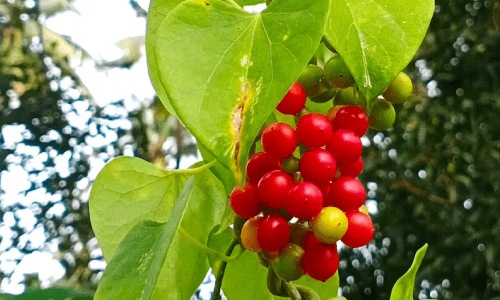Of all the herbs mentioned in Ayurveda, Guduchi or Giloy is my most favourite! It has given me the best results in treating diseases from diabetes to arthritis to autoimmune diseases to heart diseases to women’s health! Guduchi holds a significant place in Ayurveda, for its potent medicinal properties. Its botanical name, Tinospora cordifolia, stems from its heart-shaped leaves and is native to tropical regions of India, Sri Lanka and Myanmar. Guduchi is a Rasayana herb renowned for its ability to enhance immunity and promote overall health and longevity. It is classified as bitter and astringent in taste with a cooling potency, making it particularly beneficial for pacifying Pitta Dosha and balancing the body’s systems. Guduchi helps treat many ailments, including fevers, respiratory disorders, digestive issues, and inflammatory conditions. Its immunomodulatory effects help strengthen the body’s defences against infections and diseases. Guduchi also has amazing detoxifying properties, eliminating toxins and promoting cellular rejuvenation. It is often prescribed to support overall wellbeing and vitality in various Ayurvedic formulations, such as herbal teas, powders, and decoctions. In this blog, let us learn more about this amazing herb. Guduchi in Ayurveda For general wellbeing, Guduchi is rasayana (rejuvenating) and anti-aging. It also helps improve digestion, removes Ama (toxins) and strengthens the body! This herb is celebrated for its multifaceted therapeutic properties and has been utilized for centuries in Ayurvedic practice. With its bitter taste and heating potency, Guduchi is esteemed for balancing all three Doshas, particularly pacifying Pitta and Kapha imbalances. Its post-digestive sweet effect nourishes the body, while its affinity for deep tissues benefits overall vitality. Guduchi’s standout quality lies in its capacity to enhance Ojas (vitality), the essence of immunity and vitality, granting it a special potency status. It serves as a potent detoxifier, purifying the blood and eliminating toxins while bolstering the immune system against infectious diseases. Rich in bioactive compounds, Guduchi also exhibits formidable anti-inflammatory and antioxidant prowess, safeguarding against oxidative stress and inflammation. Its support for liver health, digestion, stress resilience, and skin wellness also underscores its holistic healing potential. Whether consumed as fresh juice, powder, decoction or as a part of herbal formulations, Guduchi is a cornerstone in Ayurvedic therapeutics, offering a versatile and potent ally in pursuing holistic health and wellbeing. If you ask me for one Ayurvedic supplement we all need to boost our immunity, it is this! This is one herb you should grow around your house. The most medicinal part is the stem, though we use all parts of it in various Ayurvedic medicines. Now that you have read this, please don’t run to a medical shop and look for a tablet or powder! If you can, get hold of this plant, cut the stems, dry them in sunlight, powder and store them. Boil two glasses of water, add one tablespoon, reduce to one glass, and drink before breakfast daily! Your safest immunity booster! Benefits of Guduchi Guduchi is renowned in Ayurveda for its numerous health benefits. Here are some of the vital health benefits it offers: Immune Support Guduchi is a potent immunomodulator that helps regulate and strengthen the immune system. It stimulates the production of white blood cells, enhancing the body’s defence mechanism against infections and diseases. Detoxification Guduchi is valued for its detoxifying properties. It helps to cleanse the blood, liver and other vital organs, facilitating the elimination of toxins and metabolic waste products from the body. Anti-inflammatory Guduchi possesses strong anti-inflammatory properties, which help reduce inflammation and swelling in various body parts. It is often used to alleviate symptoms of inflammatory conditions like arthritis, gout, and inflammatory bowel diseases. Antioxidant It is rich in antioxidants, such as flavonoids and polyphenols, which help to neutralize harmful free radicals in the body. This antioxidant activity protects cells from oxidative damage and supports overall health and longevity. Liver Support It is beneficial for liver health and function. It helps to detoxify the liver, protect it from damage caused by toxins and pollutants, and promote regeneration of liver cells. Digestive Health It aids digestion and helps to improve appetite. It stimulates the digestive fire (Agni), promotes the absorption of nutrients, and relieves symptoms of indigestion, bloating, and gas. Stress Reduction It is an adaptogen, meaning it helps the body adapt to stress and maintain homeostasis. It has a calming effect on the nervous system, reducing stress, anxiety, and fatigue. Fever Management It is traditionally used to manage fevers and other symptoms of viral and bacterial infections. It helps to reduce body temperature, alleviate symptoms like headache and body aches, and promote faster recovery. Skin Health It benefits skin health and can help improve complexion and treat acne, eczema, and other skin disorders. Its detoxifying and blood-purifying properties contribute to healthy and radiant skin. Anti-diabetic Properties Some studies suggest that Guduchi may have hypoglycemic effects, helping to lower blood sugar levels and improve insulin sensitivity in individuals with diabetes. Tips to grow Guduchi at home Growing Guduchi at home can be a rewarding experience, as it allows you to have easy access to this valuable medicinal herb. Here’s a guide on the best way to grow Guduchi at home. It is important to note that Guduchi is a tropical climbing vine that thrives in warm and humid conditions. Therefore, it is best to cultivate it in regions with a low or subtropical climate. Living in a colder climate, you can still grow Guduchi indoors or in a greenhouse. To start growing Guduchi, you’ll need to obtain a healthy Guduchi plant or stem cuttings from a reliable source. You can often find Guduchi plants or cuttings at nurseries specializing in medicinal herbs or online. Select a suitable location for planting Guduchi. It prefers partial shade to full sun and well-drained soil with organic matter. Guduchi is a climbing vine, so you’ll need to provide it with a sturdy trellis, fence, or support structure… Continue reading Guduchi – Why Ayurveda Calls It the Nectar of Immortality
Guduchi – Why Ayurveda Calls It the Nectar of Immortality


